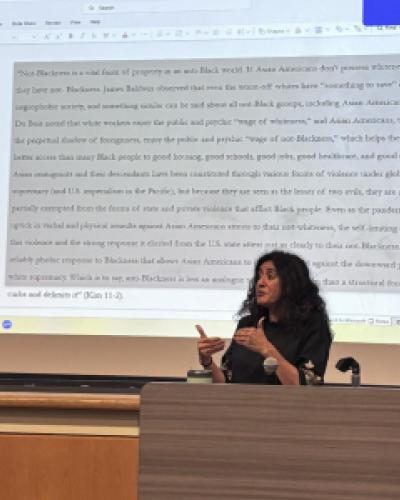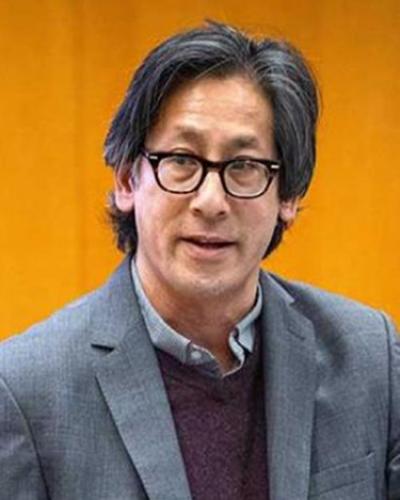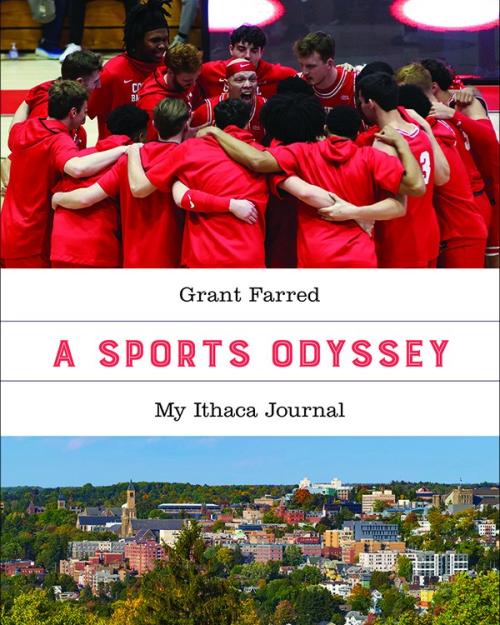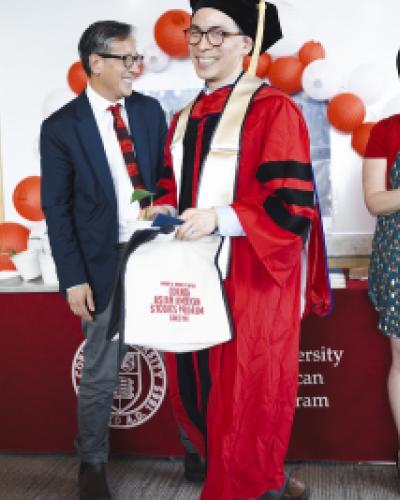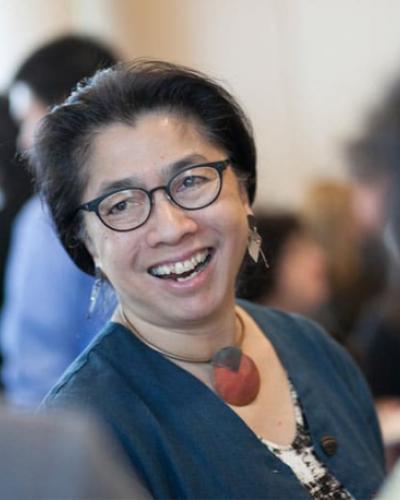Time, says Shelley Wong, “is socially constructed, continually made and remade in culturally specific ways.”
Wong’s current book project focuses on race, time, and narrative in Asian American and African American literature. She’s examining “emblematic” stories of what race has to do with time. She looks, for example, at how different people experience time and at how ideas of time have political meanings embedded in them—that is, at a politics of time.
To illustrate the point about experiencing time, Wong takes an example from Langston Hughes’ “I Wonder As I Wander,” a collection of autobiographical pieces in which the author recalls the most dramatic moments of his life in the 1930s. While visiting Tuskegee University to give a poetry reading, Hughes hears Tuskogee President Robert Moten tell a story about something that happened to him on a recent train trip. After descending the steps to the station platform in Atlanta, Moten said he suddenly heard a woman’s scream behind him. He turned, saw a woman falling down the steps and, as Hughes described it, “naturally” raised his arms to try and catch her; but when he realized that the woman was white, Moten “naturally” dropped his arms. As a black man in the South, he knew full well the potentially deadly consequences of holding a white woman in his arms.
“Between those two instants is a gap, a pause in which his decision is made, because touching a white woman, even to save her, would be dangerous. What does it mean to live in that gap of time?” asks Wong, associate professor of English and a faculty member of the Asian American Studies Program. “What you see here between the first and the second ‘naturally’ generated actions is the peculiar experience and character of one aspect of what you could call racialized time—that is, experiencing the ‘present’ in terms of a temporal cleaving, of not being able to be fully present in the moment.”

Langston Hughes, Lincoln University 1928
Wong also examines how the meaning of time has political implications—what the anthropologist Johannes Fabian calls “chronopolitics.” For example, underlying the idea of evolution is a developmental time scheme where the farther along you are on the evolutionary path the more developed and civilized you are. “At the turn of the twentieth century, women, blacks, and immigrants were often still viewed as lagging behind on the evolutionary track,” explains Wong. “This way of positioning different groups on people along an evolutionary timeline was often used as a justification for exclusionary immigration policies here in the US (people who aren’t your evolutionary peers wouldn’t be fit to be your fellow citizens), or for colonizing and imperial ventures abroad (we have to civilize them before they can advance). Who's savage or pre-modern, who’s civilized or modern—a politics of time expressed in these ways of classifying people according to certain ideas about time as linear progress are still with us, for example, when we speak of ‘developed’ or ‘underdeveloped’ nations.”
Literary genres such as the autobiography and the novel of formation also draw on that same concept of time, says Wong. She notes that the course of an individual’s development could be likened to that of the nation: these genres present developmental narratives that tell the story of the subject’s progress from youth to maturity, from a period of uncertainties about, and struggles over, the subject’s relationship to society to, finally, an accommodation or reconciliation with existing society. “The passage of a life isn’t just made up of random individual moments but is organized in culturally meaningful ways,” Wong says. “The events of a life are plotted along a narrative path that leads towards full self-realization. You could say that the narrative form itself tells a particular story—the very American story of a ‘mythology of upward mobility,’ a story with the temporal dimension, and the specifically American meaning, of progress built right into it. However, the events of many people’s lives—lives marked by differences of race, class, or gender—can’t be charted so readily or so smoothly according to the idealized coordinates of the march of progress.”
Wong is also interested in exploring the ways in which the production of knowledge itself is racialized. She explains that knowledge that’s generated through research and disseminated in the classroom or through publication is racialized insofar as its explicit subject matter is ‘race’ or ‘racism.’ “In this sense, the field of ethnic studies certainly engages in racialized knowledge production. The second way in which knowledge production is racialized has to do with the intellectual status or the degree of academic legitimacy that the university assigns to knowledge produced in the various fields comprising ethnic studies,” says Wong. Her book will also include a discussion of how knowledge production in the American university is bound up with questions of race and time.
Wong sees a central place for ethnic studies courses in university curricula, and she stresses the importance of comparative frameworks for the study of race and ethnicity, and of comparative and intersectional analyses in general. “Living in the U.S. means living in a very complex system where different things affect each other,” she says. “When taken together or when understood in relation to each other, courses in ethnic studies and gender studies, for example, reveal a more complicated, nuanced, and conflicted social reality than might be gleaned from just pursuing knowledge of one or the other of those fields.”
“It’s always been crucial to Asian American studies as a field of inquiry, and for Cornell’s particular program, to be comparative in its focus,” adds Wong. “You really can’t understand this in isolation from that. Blackness has a certain meaning because yellowness or Asianness has a certain meaning, or whiteness or brownness or maleness and femaleness have certain meanings. It’s really important to our sense of an intellectual project to see things in those terms: not just because of some impulse to try to be broadly encompassing and multicultural, but because comparative analysis has real intellectual purchase.”
She adds, “When I teach a course, I’m teaching a course for all the students here, not for one constituency or another. If you’re going to live in this society, I think it behooves you to try and understand how the society is organized, and how different people within the society experience it and live through its particular terms. You can’t live or think in a vacuum.”

